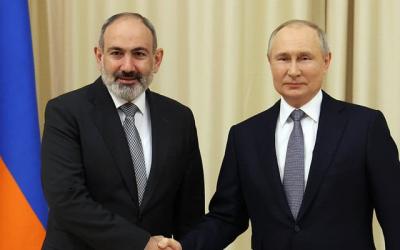Against the backdrop of the recent meeting between Russian President Vladimir Putin and Armenian Prime Minister Nikol Pashinyan in the Kremlin, the emphasis on economic relations between the countries was evident. President Putin emphasized that the trade turnover between Armenia and Russia reached a record $7.3 billion in 2023, a sign of not only Armenia's economic but also political dependence on Russia.
Economic interaction between the countries is not limited to trade relations. Pashinyan, taking advantage of the current geopolitical situation, particularly the conflict in Ukraine, has increased exports to Russia of goods that are subject to Western sanctions. This resulted in Armenia's exports to Russia increasing almost fivefold in the last year. Such actions seem to have brought significant economic benefits to Armenia but have raised questions about the long-term implications of such a strategy for the country's sovereignty.
In this context, Pashinyan seems to be trying to manoeuvre between maintaining good relations with Russia while simultaneously demonstrating independence to the West. The termination of CSTO funding, announced on the day of Pashinyan's visit to Moscow, was a prime example of this policy. This decision was probably intended to demonstrate to the West that Armenia seeks greater independence from Russian influence.
Nevertheless, there are serious challenges for Armenia in its pursuit of economic sovereignty. According to experts, Russian troops are still present on Armenian territory, most of the country's energy resources are controlled by Russia, and Russia accounts for a significant part of Armenia's foreign trade turnover. All of this creates certain risks and calls into question the possibility of the country's full economic independence.
The interaction between Putin and Pashinyan during the meeting did not show signs of tension, which could indicate deeper and tougher negotiations. Rather, the atmosphere was amicable, which could indicate a desire on both sides to maintain the status quo.
Thus, recent events underscore the complex game Armenia is playing as it seeks to maintain a balance between Eastern and Western interests. This state of affairs requires not only diplomatic ingenuity but also strategic foresight on the part of the Armenian leadership, as not only the country's foreign policy position but also its domestic economic well-being depends on each step.
While Armenia is demonstrating economic growth and, by some measures, successfully overcoming the consequences of international sanctions against Russia, the situation remains ambiguous. The increase in exports of sanctioned goods to Russia creates certain risks for the Armenian economy in the long term. This is due to the possible intensification of international pressure and new sanctions, which may affect not only Russia but also its trade partners.
In addition, the decline in energy consumption in the context of rapid economic growth raises questions about the sustainability and true motives of Armenia's economic policy. This unusual phenomenon may indicate either a significant improvement in efficiency or the unsustainability of the current economic boom, which may be artificially stimulated by temporary factors such as the redistribution of trade flows due to sanctions.
The announcement that Armenia will stop funding the CSTO could also have far-reaching consequences. This announcement, perhaps intended to strengthen ties with the West, may force Russia to reconsider its economic and military commitments to Armenia, which in turn could lead to a shift in the balance of power in the region.
Against the backdrop of these developments, it is clear that Armenia stands at the crossroads of foreign policy strategies. Maintaining sustainable economic growth while ensuring political and military security requires Pashinyan and his government not only a deep understanding of the international arena but also the ability to adapt to the ever-changing geopolitical realities.
Armenia's future will depend on how successfully the country can manoeuvre between Eastern and Western interests while preserving its national identity and aspirations for economic self-sufficiency. This is a complex task that will require not only diplomatic wisdom from the Armenian leadership but also a strategic vision of the country's future in a changing world.
Samir Valiyev
AzVision.az
More about:
















































